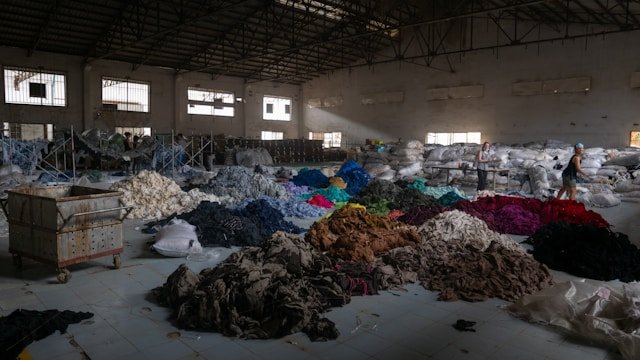At Mavuika, we believe that fashion should not come at the expense of the environment. As a brand committed to sustainability, we are dedicated to making responsible choices in every aspect of our business. From sourcing eco-friendly materials to implementing ethical manufacturing practices, we strive to reduce our carbon footprint and promote a more sustainable future.
The Importance of Sustainable Fashion
The fashion industry is one of the largest contributors to environmental pollution, with significant impacts on water, air, and soil quality. Fast fashion, in particular, has led to an increase in waste and exploitation of natural resources. At Mavuika, we recognize the need for change and are committed to doing our part to create a more sustainable fashion industry.
The negative environmental impact of fast fashion is staggering. The industry is responsible for about 10% of global carbon emissions and is the second-largest consumer of water worldwide. The production of cheap, disposable clothing leads to mountains of textile waste, with millions of tons ending up in landfills each year. Additionally, the use of toxic chemicals in dyeing processes and the reliance on non-renewable resources contribute to widespread environmental degradation.
Eco-Friendly Materials
One of the key ways we promote sustainability is through the use of eco-friendly materials. We carefully select fabrics that are not only high-quality but also have a minimal environmental impact. Some of the sustainable materials we use include:
Organic Cotton:
Grown without the use of harmful pesticides and synthetic fertilizers, organic cotton is better for the environment and the farmers who grow it. Traditional cotton farming uses a large amount of water and chemicals, which can lead to soil and water contamination. Organic cotton farming methods help preserve soil health and reduce water usage, making it a more sustainable choice.
Recycled Materials:

We incorporate recycled fabrics into our collections, reducing the demand for new raw materials and diverting waste from landfills. Recycled polyester, for example, is made from post-consumer plastic bottles, giving new life to materials that would otherwise contribute to pollution.
Bamboo:
Bamboo is a highly sustainable resource that requires less water and no pesticides to grow. It also has natural antibacterial properties, making it a great choice for clothing. Bamboo grows rapidly and can be harvested without killing the plant, ensuring a continuous supply without the need for replanting.
Ethical Manufacturing
In addition to using sustainable materials, we are committed to ethical manufacturing practices. We work with factories that adhere to strict labor standards, ensuring fair wages, safe working conditions, and no exploitation of workers. By choosing to partner with ethical manufacturers, we aim to create a positive impact on the communities involved in the production of our garments.
Many garment workers around the world face poor working conditions, low wages, and a lack of job security. By ensuring our manufacturing partners uphold ethical standards, we contribute to improving the quality of life for these workers and supporting their families. Our commitment to ethical manufacturing extends to transparency, allowing consumers to know where and how their clothes are made.
Reducing Waste
Reducing waste is a crucial aspect of our sustainability efforts. We implement several strategies to minimize waste throughout our production process:
Efficient Cutting Techniques:
By using efficient cutting techniques, we reduce fabric waste and make the most out of each piece of material. This approach not only minimizes waste but also helps lower production costs, which can be passed on to consumers.
Upcycling:
We incorporate upcycling into our design process, turning leftover fabric and materials into new products. This creative approach to waste reduction results in unique, one-of-a-kind items and helps reduce the environmental impact of our operations.
Minimal Packaging:
We use minimal, recyclable packaging to reduce our environmental footprint. Excessive packaging contributes to waste and pollution, so we opt for simple, eco-friendly packaging solutions that protect our products while minimizing environmental impact.
Sustainable Practices in Our Operations
Sustainability extends beyond our products to every aspect of our operations. We are committed to reducing our carbon footprint and promoting eco-friendly practices within our organization. Some of the steps we take include:
Energy Efficiency:
We use energy-efficient lighting and equipment in our offices and production facilities to reduce energy consumption. Switching to LED lighting, implementing smart energy management systems, and using energy-efficient machinery are just a few ways we work to decrease our energy use.
Waste Reduction:
We implement recycling programs and encourage our employees to reduce waste in their daily activities. Office recycling initiatives, composting programs, and digital documentation systems help us minimize waste and promote a culture of sustainability.
Sustainable Shipping:
We choose eco-friendly shipping options and partner with logistics providers who prioritize sustainability. This includes using biodegradable packing materials, consolidating shipments to reduce transportation emissions, and supporting carbon offset programs.
Educating and Empowering Consumers
We believe that education is key to driving change in the fashion industry. By educating our customers about the importance of sustainable fashion, we empower them to make informed choices. We provide information about the materials and processes used in our products, highlighting the benefits of choosing sustainable options.
Our website and social media platforms feature detailed descriptions of our sustainability practices, behind-the-scenes looks at our production process, and tips for consumers on how to live more sustainably. We also collaborate with influencers and organizations that share our commitment to environmental responsibility, spreading awareness and inspiring others to join the movement.

